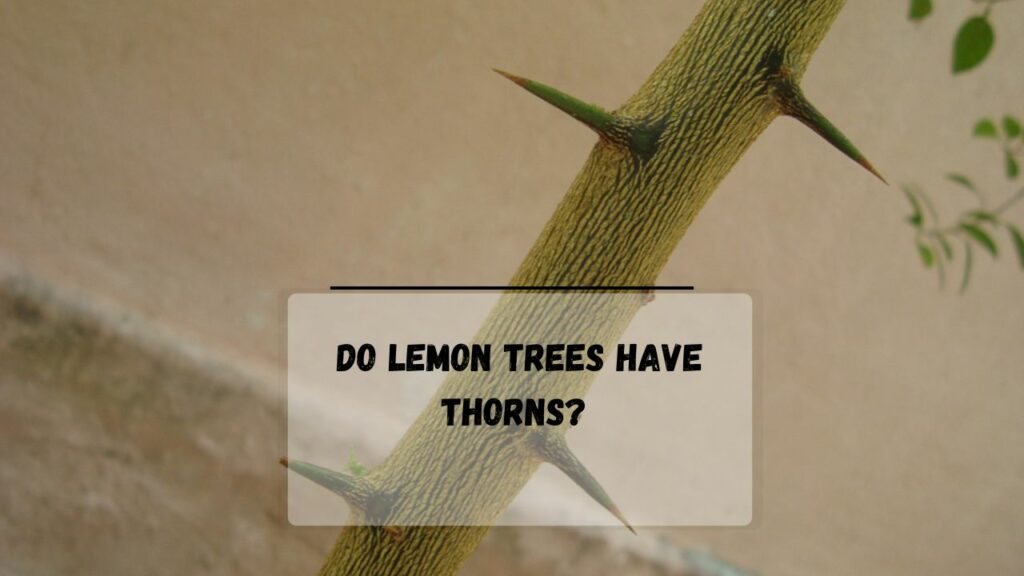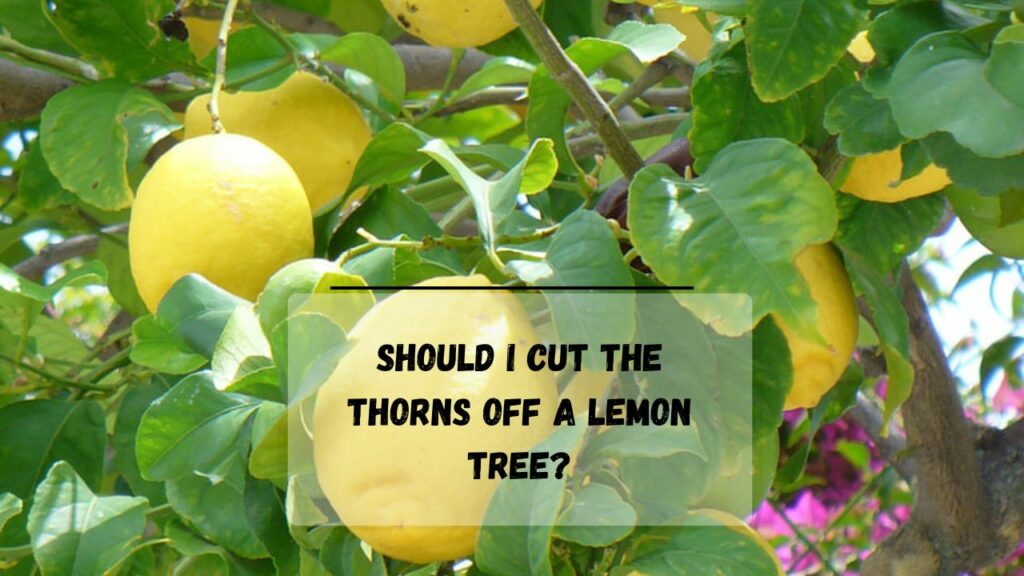
Like any other citrus plant, lemon trees also have thorns for a fundamental reason. This article is for you if you don’t know what purpose thorns serve. In this article, I will discuss ‘why lemon trees have thorns’ and what you can do about it.
We will further discuss the pros and cons of lemon tree thorns and what possible allergic reaction to lemon Tree thorns is likely to cause. Since lemon tree thorns can also be inconvenient and problematic to you or especially to those who harvest the fruit, you need to manage them in your garden or orchard.
After reading this article, I hope you will better understand why lemon trees have thorns and how to care for them to ensure you get a bountiful harvest. Let’s first find out ‘do lemon trees have thorns’ if yes, what type of lemon trees have thorns?
Do Lemon Trees Have Thorns?

Yes, lemon trees can have thorns! Since Lemon trees belong to the citrus family, it is not uncommon to notice Citrus lemons growing thorns on their branches. Lisbon lemons are known for being naturally very thorny, while Eureka lemons are nearly thornless.
If you’ve grafted your lemon tree onto a rootstock, it may produce thorny suckers from the graft union. Therefore it is not uncommon to see water sprouts growing on your tree. I highly recommend you be aware and remove it as soon as possible.
Since lemon tree thorns can be a real pain, I highly recommend you work on it. If you ignore the thorns, they can easily puncture the fruit and create entry points for bacteria. This bacteria can then lead to black spots on your lemon tree fruit.
The most common bacteria responsible for developing black marks on your Lemon Tree fruit is Pseudomonas syringae. I highly recommend you keep your lemon tree healthy and disease-free. Also, I’ll recommend you be sure to wear protective gear. Note that sanitizing your cutting tools when working around the tree is essential.
You should also know that not all lemon trees have thorns. I recommend you to be aware of the ones that do. Keep an eye out and take the necessary steps to keep your lemon tree thriving. Therefore, to keep your Lemon Tree healthy, let’s find out nine reasons lemon trees have thorns.
9 Reasons Why Do Lemon Trees Have Thorns?
To Deter Herbivores
Believe it or not, lemon tree thorns are a natural barrier protecting your tree and its fruit from herbivores. Many pests and herbivores would love to attack and feed on lemon tree leaves, branches, and fruit.
To Self-Defense
Like any other citrus fruit Tree, Lemon trees also develop thorns which help them defend against potential predators or damage from other elements like wind or rain.
To Conserve Resources
With the help of grown thorns, your Lemon trees can effectively conserve their resources. Due to thorns, your Lemon Tree doesn’t need to put energy into producing additional growth that would be attacked fed by herbivores.
To Improve Competitiveness
If your property has many other plants and weeds/grass growth on the ground, your lemon tree will have to compete for resources. Therefore, developing thorns help your Lemon Tree compete for light and nutrients with other plants in their environment.
I would highly recommend using a proper type of tree with the mag to prevent weed or grass growth around the base of your lemon tree trunk. In addition, you can also consider alleviating the natural beauty of your landscape by building a patio. However, if many roots are likely to be damaged by a deck, consider making a floating patio design.
To Protect Their Seeds & Fruits
Just like any other citrus fruit tree, lemon trees are also prone to be attacked by animals and get their seeds/fruits eaten. To protect themselves from being eaten by wild animals and birds, a few species of lemon trees are known to develop thorns. Therefore you should never worry about your lemon tree thorns if it is to prevent reducing the number of seedlings that grow in the future.
To Maintain Its Stability
Do you know thorns help maintain the tree’s stability by adding extra support to the branches? Hence, few lemon tree species are known to develop thorns to prevent their constituents from breaking or snapping under heavy weight or strong winds.
To Promote Growth
With the help of thorns, the lemon trees can provide the reasons like water and the growth of new branches and suits. Therefore it is common to notice a few varieties of Lemon trees develop thorns which lead to a healthy and more productive tree.
To Cope with Environmental Stress
It is not uncommon to note that Lemon Tree leaves color change due to environmental stress. Therefore, your tree may develop thorns to withstand environmental pressure like drought or extreme temperatures. As mentioned earlier, Lemon Tree thorns are a physical barrier against potential damage.
To Attract Pollinators
During my research, I learned that few species of lemon trees are known to attract pollinators by developing thorns. Therefore, maybe your tree’s presence of thorns is to attract pollinators, like bees, butterflies, etc. I don’t need to tell you the importance of pollinators because they are essential for the tree’s reproduction and fruit production.
You should know that Lemon trees have thorns for various reasons, all related to the survival and protection of the tree and its fruit. Even though it can be very frustrating and annoying for you when trying to harvest its fruit, the thorns also serve a crucial role in maintaining the health and productivity of your tree also.
Thus, people may ask whether they should cut the thorns of a lemon tree. Since it is already a very controversial issue and the most debated question among communities, I will help you learn what you should do about it. Let’s first get the answer to the question: Should You Cut The Thorns Off A Lemon Tree?
Should I Cut The Thorns Off A Lemon Tree?

It depends. Cutting the Thorns off Lemon Tree can give you an easier handling time and aesthetic appearance of your tree. However, it can compromise their protection and cause structural damage if not properly removed.
I recommend you prune its thorns only. Throughout my research, I learned that some people believe that cutting off the thorns can make the tree easier to handle, especially if you’re harvesting lemons or pruning the tree. On the other hand, other people believe that thorns are essential in protecting the tree from herbivores and other pests then; what should you do?
What To Do? 3 Things To Keep In Mind
- When trying to harvest lemons from your tree, you can get cuts and experience a bit of pain. Therefore, you will find it easy to do tasks and less painful if the Thorns are entirely removed before harvesting. However, it would be best if you never cut the Thorns at a very early stage as they act as a barrier of protection for the fruits and seeds of your tree. I recommend you consider pruning the Thorns or cutting them before two days of harvesting.
- If you are one of those who prefer the Lemon Tree’s aesthetic appearance, you can remove the Thorns altogether. However, it is not a permanent solution because the thoughts will likely regrow.
- When trying to prune or cut the thorns, use the proper type of Pruning shear with the appropriate technique. Improper Pruning can lead to severe structural damage to your Lemon Tree. It will inevitably affect & harm your tree’s overall health and ability to produce fruit.
So, whether you should cut off the thorns on your lemon tree depends on your preferences and priorities. If the thorns are not a problem for you, I will highly advise you to leave them intact so that they act as a barrier of protection for the tree from herbivores and animals. However, if you find the thorns are becoming a problem, you can consider cutting them off; just be aware of the thorn’s regrowth.
Is There Any Possible Allergic Reaction To Lemon Tree Thorn
Yes, there are some possible allergic reactions to Lemon Tree Thorns, like inflamed skin rashes, itches, eye irritation & redness, and respiratory problems. Many people complain about respiratory issues like coughing, wheezing, and shortness of breath due to inhaling the oil or the SAP of their Lemon Tree thorns.
In addition, one of the most common allergic reactions frequently reported due to coming in contact with lemon’s thorn SAP or oil is red and inflamed skin rashes requiring dermatitis consultation.
Besides this, it can also be excruciating for you if the Lemon Tree Thorns sap gets into your eye. If this is the case, I recommend you rinse your eyes thoroughly with water as soon as possible. If any of these symptoms are noticed with your lemon tree or after being around your lemon trees with thorns, I recommend you seek medical attention.
Many treatment options are available if you experience an allergic reaction to a lemon tree’s thorns but consult a professional first.
Even though many types of over-the-counter antihistamines can help you reduce itching and redness, you should seek medical consultation before using topical creams to soothe your skin.
Using improper medication or topical cream can cause the reaction to become more severe. Make sure to consult a doctor for a proper prescription of more potent medicine.
Also, I recommend you take precautions when working with lemon trees and avoid coming into contact with their thorns. When trying to harvest fruit or prune their thorns, it is recommended to wear gloves, long sleeves, and protective eyewear.
Also, I highly advise avoiding touching your face or eyes while handling your lemon tree. If you take proper precautions when harvesting fruit or handling your Lemon Tree, you can get plenty of production without experiencing any allergic reaction. After knowing so many things, let’s find out some frequently asked questions about Lemon trees Thorns.
FAQ
What are the possible symptoms of an allergic reaction to a lemon tree thorn?
If you are allergic to a lemon tree Thor, you will likely notice symptoms like redness, itching, swelling, or any other severe case, including difficulty breathing. This only happens when you contact your Lemon Tree Thorn directly. I recommend you seek medical attention if the allergic reaction is very severe.
Conclusion
I tried my best to give you a better understanding of ‘why my lemon tree has thorns.’ As I told you, Lemon trees use their thorns to protect themselves from herbivores, compete for resources, and even help pollinate.
So if you are confused about whether you should cut the thorns off, it’s a personal choice and your preference. Removing the lemon tree thorns can help some people perform easier maintenance and harvesting, but it directly compromises your tree’s vulnerability.
If you remove the Thorns unexpectedly, your tree will be vulnerable to pests, diseases, and herbivores. To some people, the thorns of the lemon trees can also cause allergic reactions, ranging from skin irritation to difficulty breathing.
So, I Highly recommend you be aware of these potential reactions and take necessary precautions. After reading this article if you find this post helpful after reading this article, consider sharing it.
Your share will help many people learn about the actual advantages & disadvantages of cutting Lemon Tree horns. Do check our other helpful guide on Lemon Tree care and maintenance. See you in the next post. Till then, take care and goodbye.
